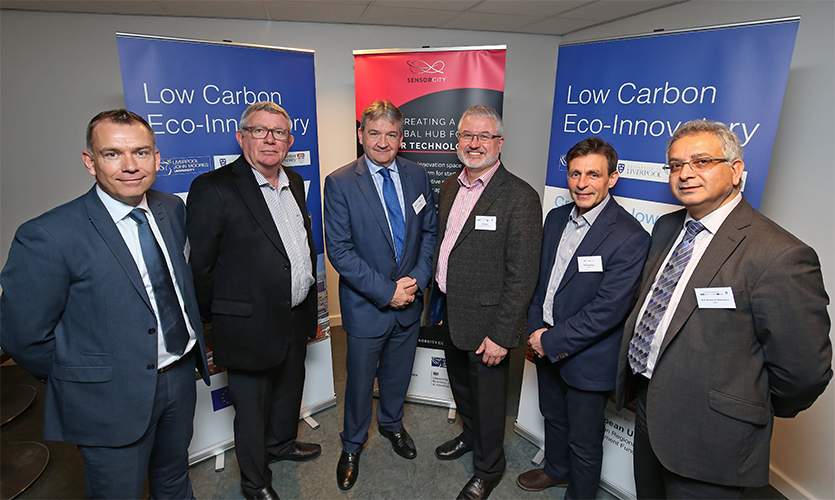Collaborating with the chemical and shipping industry for a technology-driven low carbon supply chain

Liverpool John Moores University recently brought together representatives from the chemical and shipping industry to discuss innovative solutions to the sector’s supply chain. This offered an insight into the benefits of new higher education initiatives and technology opportunities including Degree Apprenticeships, Sensor Technology and support to reduce the Carbon Footprint of the industry.
The LJMU Low Carbon Eco-Innovatory led the LJMU Chemical Supply Chain Forum event in partnership with C3, with the aim of developing collaborative partnerships between local companies in the Liverpool City Region and University researchers, students and academic staff. There was also the chance to identify opportunities for low carbon development which will ultimately bring about economic and environmental benefits to businesses across the sectors.
The chemical sector alone employs around 140,000 people directly and supports in total around half a million jobs in the UK economy – many in the North of England and Scotland, while the chemical and pharmaceutical industry adds £15 billion of value to the UK economy every year from total annual turnover of around £50 billion. With such a big impact on the economy, it is key that everyone involved in the supply chain works together and has access to the latest research and technology.
Ian Jones, MD Warrant Group and Partner in C3 explained:
“The main aim of the event was to break down the walls and understand what is stopping people and companies from collaborating to create a much stronger industry. Working with LJMU, we can provide more visibility of the supply chain, for example using sensor technology to track cargo. Optimisation in supply chain is key, and the LJMU Degree Apprenticeship programme can bring in the right talent pool and encourage young people to stay in the industry. The carbon footprint is also a major factor in making the supply chain work effectively. That is why C3 is working with the LJMU Low Carbon Eco-Innovatory as we want to support businesses to identify and overcome common barriers to trade. It can be difficult for individual SMEs to achieve this on their own, therefore we want to enhance and have a collaborative approach for skills resources and influences.”
Manufacturers, importers, exporters and logistics service providers attended the event, which saw a keynote address from the COO Peel Ports Group, Gary Hodgson, who said:
“Partnerships with academia can generate many solutions for a supply chain that will be driven by technology. The chemical and shipping sectors need to work together with each other and Liverpool John Moores University to make the most of research and development opportunities in this field.”
Professor Ahmed Al-Shamma'a, LJMU Executive Dean for the Faculty of Engineering and Technology, discussed Sensor Technology and the Chemicals Industry and the importance of Sensor City to the supply chain, stating how it could ‘foster the creation, development, production and promotion of cutting edge sensor technologies for use in a wide range of sectors.’
Professor Andy Ross, Degree Apprenticeships Lead at LJMU informed the industry representatives on how ‘educating and retaining skilled people and understanding the technology can optimise logistics and processes.’
Dr Thanh Nguyen, a Reader in Operational Research at LJMU, provided an academic research overview into Low Carbon Innovation and Process Optimisation and how this can help with port expansion and increased freight traffic using mathematical modelling for optimisation. He explained how this could lead to cases for new or expanded roads and junctions, and investment into auto vehicles for long-term low carbon return.
Neil Moon, COO Think Global Growth, discussed the benefits of collaboration supply chains in the chemical industry and how this can help against increasing pressures, including energy prices, environmental requirements, infrastructure issues, the skills gap and changing relations with Europe. He emphasised how working with LJMU is important to C3, as the University ‘brings tremendous technology and tech solutions to supply chain issues alongside expert resources, access to grants and finance opportunities essential to deliver some of collaboration opportunities.’
The LJMU Low Carbon Eco-Innovatory has received £5m of funding from the England European Regional Development Fund (ERDF) as part of the European Structural and Investment Funds Growth Programme 2014-2020. The Department for Communities and Local Government is the Managing Authority for ERDF. Established by the European Union ERDF funds help local areas stimulate their economic development by investing in projects which will support innovation, businesses, create jobs and local community regenerations. Low Carbon Eco-Innovatory is a unique partnership between Liverpool John Moores University, University of Liverpool and Lancaster University and part-funded through the European Regional Development Fund (ERDF). The Project is co-ordinated by LJMU with Professor Ahmed Al-Shamma’a, the Project Director.
For more information visit https://www.gov.uk/european-growth-funding



